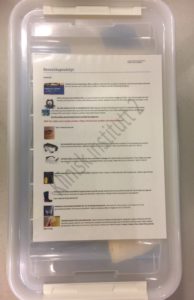Life-saving first aid
Provide life-saving first aid until the emergency services arrive.

Copyright: Colourbox
See here for more information on first aid.
Cuts and wounds
Cuts, puncture wounds and eye injury:
- Immediately rinse for 5 minutes with copious amounts of running water.
- Use an eye rinser (by the sink) if a squirt gets in your eyes.
- If infectious matter is spilled onto skin, a skin disinfectant can be used for 3-4 minutes.
- With cuts and puncture wounds that may result in blood contamination, you should immediately contact the infectious medicine specialist on duty at Haukeland University Hospital, see the action list.
- Complete a non-conformity form
First aid in case of danger of exposure by blood or other biological factors:
Cuts and puncture wounds may result in unwanted transfer of blood or other biological factors. See action list.
Blood contamination is an infection which may transfer via blood, blood products, bodily fluids or tissue fluids. Contamination occurs through inoculation, transfusion or contact with contaminated fluids, tissue and mucous membranes. Blood contamination does not usually occur through intact and undamaged skin. With a positive contamination source of Hepatitis B, vaccination of non-vaccinated personnel and vaccinated personnel with known low antibody Hepatitis B should be immediately initiated. In addition, Hepatitis B immunoglobulin may be administered in these instances.
Action list:
- Perform first aid procedures.
- Necessary documents such as requisition and procedure are available at the administarion on the 8th floor, office no. 8455.
- Blood test (“0” test) must be taken within 48 hours.
- Obtain a blood sample from the source of contamination (if you have their consent).
- Assess sourse of infection and risk.
- Contact the company health service.
- Optional treatment starts.
- Follow up of the incident.
See here for complete procedure:
Address:
- Medical Emergency Ward: Phone: 55 56 87 60 or 116117 Solheimsgaten 9.
Complete the necessary documents:
Complete a non-conformity form
Complete and submit the NAV injury form
Acute poisoning
The Norwegian Poison Information Centre provide information about acute poisonings and give advice about treatment in cases of poisoning. They offer a 24 hours emergency service to the general public and to health care professionals. Contact the Poison Information 22 59 13 00 if you suspect poisoning.
Emergency number with support and information during incidents with hazardous materials/hazardous chemicals, contact CHEMTREC: +(47)-21930678.
First aid cabinet
Each laboratory should be fitted with a first aid cabinet , which as a minimum contains plaster and skin disinfectants.
Emergency equipment
Familiarize yourself with the nearest location of emergency equipment in the laboratory where you will perform your work. The kits are located on the 1st, 3rd, 5th and 8th floor of the Lab Building, at BUS and Gynecology & Obstetrics. Instructions are available on the box lid. Each kit contains:
- Face mask
- Full protective mask for protection against gas and particles.

- Mask filters (2).
- Fire blanket
- Protective goggles
- Hearing protection
- Rubber boots that withstand acids, chemicals, etc. 2 pairs, Men’s and Women’s sizes
- 4H Gloves that withstand most chemicals.
- Absorption cloth for chemicals.